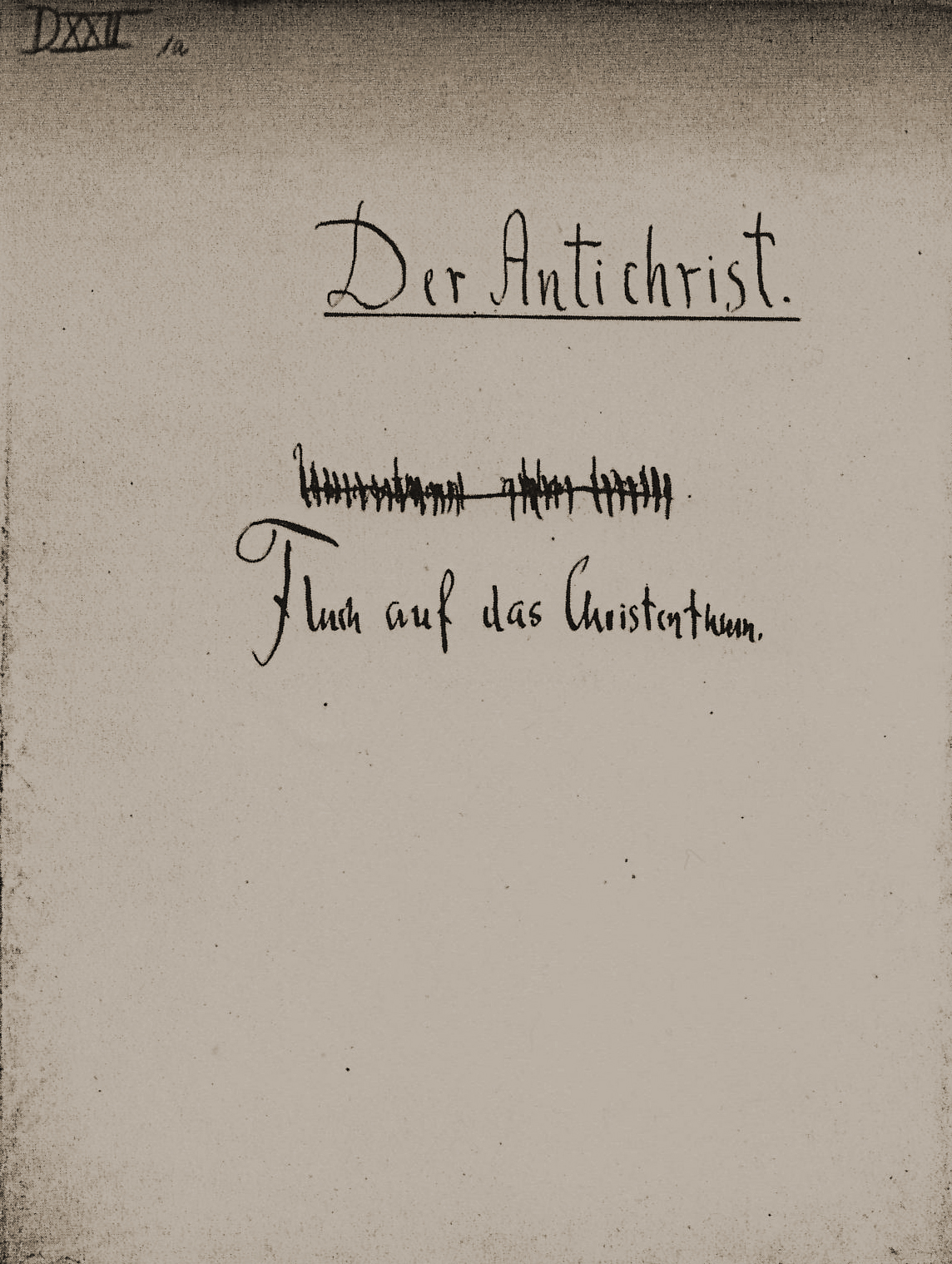I have almost no tolerance left for Christians. They are our first and biggest roadblock. We will not find the strength to fight Judea in the world until we exorcise the jew in our heart.
Christianity itself the original sin. I think that being raised Christian is kind of like being born half white.
You will never truly feel at home with your native spirituality, but you are also never comfortable with the alien Semitic religion.
It is the poison pill that makes you doubt all of your instincts–really doubt yourself.
Month: April 2018
Pilate or Jesus?
Or:
On purple-pill addicts
This post is a response to Arch Stanton: Pay attention to what I said today in the hatnote of the 60th entry of Kriminalgeschichte: ‘In a nutshell, any white person who worships the god of the Jews is, ultimately, ethnosuicidal’.
Jesus of Nazareth is considered ‘god’ by Christians, mysteriously the same as the first person of the trinity, the god father: the same Yahweh of the Jews, right? Well, if the hatnote that accompanies the entries of Deschner’s series describes reality, you yourself, by holding Jesus high, are an ethnosuicidal white.
I will be very frank. I do not believe that what you say in your novel about Jesus was historical. It could have been historical, as it could be historical the version of Jesus that appears in Evropa Soberana’s ‘Rome vs. Judea’: two different and irreconcilable visions of the historical Jesus.
I do not believe any. As I let you know in other discussion threads, there are as many Jesuses as New Testament students who fall into the temptation to write a ‘Jesus life’, as if that were possible.
It’s not possible. Already from the times of Albert Schweitzer it was known that it was impossible. The New Testament is a very problematic text because it is a kerygma. It is not a true and objective testimony about biographical facts: it preaches a new doctrine. Wanting to extract history out of such a text is like wanting to extract real history from what the Old Testament says about Moses; what the Buddhist texts initially passed on orally by monks say of Buddha, or what the Qur’an says of Muhammad.
Let’s go to the point regarding your novel. The fight between Jesus and the High Priest that appears in the gospels, which culminated in the expulsion of the merchants from the temple and eventually in the crucifixion of Jesus, is to be understood as a quarrel between Jews. Every Aryan who takes sides in such a quarrel is Judaised.
Even if the story is non-fictional whatever happened between the preacher Yeshu—whose mother Miriam was Jewish—and the temple authorities does not concern us in the least. What concerns us is what the Romans thought: Our people, the representatives of our culture. As Nietzsche said, the only decent character in the entire New Testament was Pilate.
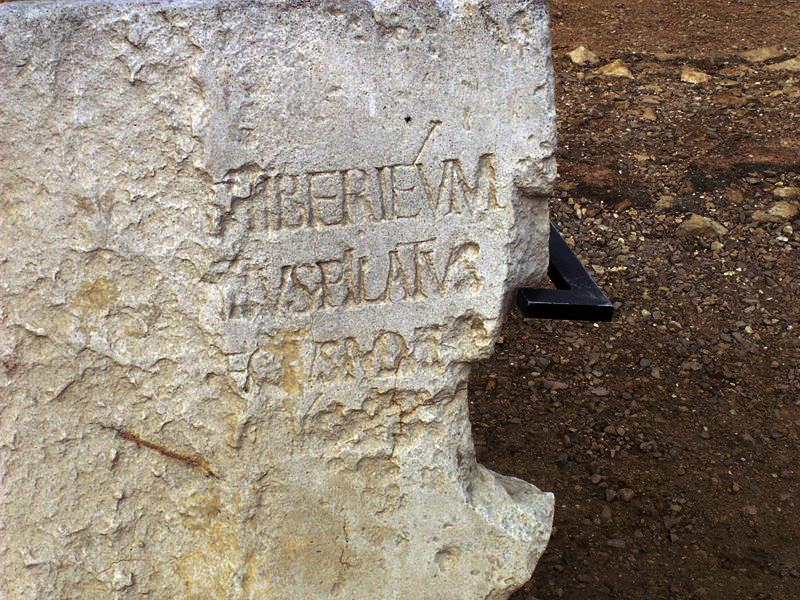
Limestone block discovered in 1961 with Pilate’s
tribute in Latin to Tiberius. The words […]TIVS
PILATVS can be clearly seen on the second line.
But you do not have the white Pilate as the man to admire of the New Testament. You have a fucking Jew. You do not realize that, with that admiration, you, like so many white nationalists who are still clinging to their parents’ religion, are doing something harmful to the white race.
It is this kind of thing that produces a tectonic earthquake, it opens a grand canyon so to speak, between me and the nationalists. The white nationalists who maintain vestiges of Christianity are not aware of the fact that they are as much part of the problem as of the solution.
Very few racists, like Hitler in his after-dinner talks and Pierce on this side of the Atlantic, came to take the red pill. As I said elsewhere, the Alt-Right people prefer the purple.
Below, an abridged translation from the first volume of Karlheinz Deschner’s Kriminalgeschichte des Christentums (Criminal History of Christianity). For a comprehensive text that explains the absolute need to destroy Judeo-Christianity, see here. In a nutshell, any white person who worships the god of the Jews is, ultimately, ethnosuicidal.
The Emperor Theodosius ‘the Great’
Theodosius I (reign 379-395) found in the father of the Church, Ambrose, an energetic travelling companion. ‘There is hardly a year of his reign’, says the Protestant theologian Von Campenhausen, ‘that he does not proclaim a new law or other measures to fight against paganism [Note of the translator: Hellenism] and to suppress heresy and to favour the Catholic Church’. ‘The annihilation of those who thought differently was, from the beginning, the goal of his government, and the ecclesiastical tradition, which describes Theodosius as an indefatigable protector of Catholicism and an enemy of all heresies and paganism [Hellenism], has portrayed him with complete fidelity’.
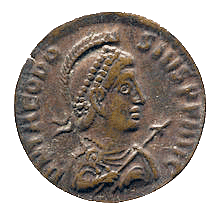
(Above, a Nummus of Theodosius.) However, the special merit of the Catholic sovereign consisted in a new policy towards the Germans. In his reorganization of the army, seriously severed, he incorporated ‘barbarians’ (they followed a trend that existed since Constantine) even in the leadership: Franks, Alemanni, Saxons and especially Goths, and with this ‘Gothfied’ army he cleansed the Balkans of Goths, that although officially they belonged to the Empire were not citizens but servants. In his first year of reign, he thus won victories over the Goths, the Alans, and the Huns.
Theodosius, as they always say full of ‘magnanimity towards the vanquished’ (Thiess), ‘the last great protector of the Germans on the Roman imperial throne’ (von Stauffenberg), never fought battles following every rule. Following Valens’ hunting of Gothic heads, he carried out a kind of guerrilla warfare, for which he sacrificed ‘unscrupulously or intentionally’ also the Gothic troops themselves (Aubin). The same as Gratian, he sought to annihilate one after another the various groups of ‘barbarians’.
Thus, he attacked isolated Goth contingents where he thought fit, as for example in 386 a troop of Ostrogoths led by Prince Odotheus. In autumn, they had requested permission to cross the river at the mouth of the Danube, although at first Promotus, the Magister militum that ruled Thrace, denied it. However, a dark night drew them to the river to fall into the hands of the Roman army. They set out to cross it with three thousand boats—the river was full of corpses—and were immediately defeated, while the women and children were left in captivity. However, surely the emperor’s Goth policy would have been different if he had had enough strength.
Theodosius hurried to celebrate the feat and on October 12, with his chariot drawn by elephants (a gift of the Persian king), entered triumphantly in Constantinople, where he had a commemorative column of 40 meters high in memory of this and other massacres of ‘barbarians’. Some years later, his general Stilicho caused a serious setback to another group of Goths. Bishop Theodoret informs with joy about ‘killings’ with ‘many thousands’ of ‘barbarians’ massacred. On the other hand, the prisoners of such operations flooded the slave markets throughout the East.
And from then on, thanks to the ‘merits’ of Theodosius, in all the battles of the invasion of the barbarians there are Germans fighting on both sides.
______ 卐 ______
Liked it? Take a second to support The West’s Darkest Hour.
On white sins
It is true that this site focuses on the Christian problem. But that does not mean that I believe that Christian ethics is the sole sin in white decline. Our focus is due to the fact that no Alt-Right site is exposing such sin as a factor to be studied.
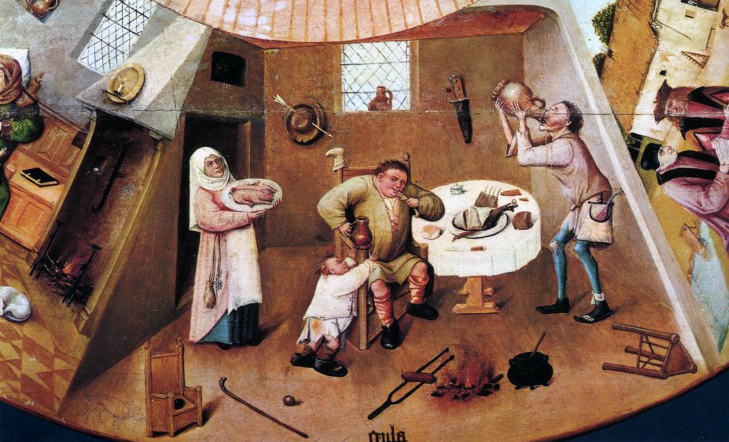
There are other cardinal sins. Recently for example Tom Sunic said: ‘Both the early liberals C. Montesquieu and later A. Smith wrote that “merchant ignores all borders.” This is how the West was designed by the world improvers in the wake of WWII’.
In other words, in addition to Christian ethics being a pig is a major factor in the downfall of whites!
On the uses of philosophy
 There is a pleasure in philosophy, and a lure even in the mirages of metaphysics, which every student feels until the coarse necessities of physical existence drag him from the heights of thought into the mart of economic strife and gain.
There is a pleasure in philosophy, and a lure even in the mirages of metaphysics, which every student feels until the coarse necessities of physical existence drag him from the heights of thought into the mart of economic strife and gain.
Some ungentle reader will check us here by informing us that philosophy is as useless as chess, as obscure as ignorance, and as stagnant as content. “There is nothing so absurd,” said Cicero, “but that it may be found in the books of the philosophers.” Doubtless some philosophers have had all sorts of wisdom except common sense; and many a philosophic flight has been due to the elevating power of thin air. Let us resolve, on this voyage of ours, to put in only at the ports of light, to keep out of the muddy streams of metaphysics and the “many-sounding seas” of theological dispute.
But is philosophy stagnant? Science seems always to advance, while philosophy seems always to lose ground. Yet this is only because philosophy accepts the hard and hazardous task of dealing with problems not yet open to the methods of science—problems like good and evil, beauty and ugliness, order and freedom, life and death; so soon as a field of inquiry yields knowledge susceptible of exact formulation it is called science. Every science begins as philosophy and ends as art; it arises in hypothesis and flows into achievement.
Philosophy is a hypothetical interpretation of the unknown (as in metaphysics), or of the inexactly known (as in ethics or political philosophy); it is the front trench in the siege of truth. Science is the captured territory; and behind it are those secure regions in which knowledge and art build our imperfect and marvelous world. Philosophy seems to stand still, perplexed; but only because she leaves the fruits of victory to her daughters the sciences, and herself passes on, divinely discontent, to the uncertain and unexplored.
So let us listen to these men, ready to forgive them their passing errors, and eager to learn the lessons which they are so eager to teach, “Do you then be reasonable,” said old Socrates to Crito, “and do not mind whether the teachers of philosophy are good or bad, but think only of Philosophy herself. Try to examine her well and truly; and if she be evil, seek to turn away all men from her; but if she be what I believe she is, then follow her and serve her, and be of good cheer.”
______ 卐 ______
Editor’s comment:
All this sounds very nice. I will never have a command of the English language as Durant had it. But I had to celebrate more than fifty springs to begin to understand things I did not see when, as a teenager, I wanted to pursue a philosophy course. Now I see things that not only an adolescent is incapable of seeing on his own, but that even when doing a philosophy career the ‘mature’ academic usually doesn’t see.
With elementary knowledge of the central tragedy of the West—the takeover by the Judeo-Christians that destroyed the classical world—, Durant’s exposition seems ignorant. Although he does not devote whole chapters to the scholasticism that he so despises, he does not seem to notice, as Ferdinand Bardamu realised in an entry reproduced this month, that the ‘secular’ liberals, socialists and utopians were influenced by the Christian ethic in an extraordinary way.
But long before I read Bardamu I was extremely irritated by the philosophy of the back doors of Kant and Descartes (and I don’t forget the chapter on ‘The New Understanding of God’ in Does God Exist? by Hans Küng and in his erudite study on Hegel). Descartes alleged that he began his philosophical system in tabula rasa but, as soon as he reached the conclusions he wanted, he immediately went to the church to thank Providence. The self-deception not only of Kant and Descartes but of other modern philosophers is truly overwhelming: everything opposite to the ‘Know Thyself’ that was recorded in the Oracle of Delphi before the damned Christians destroyed it.
Now I see from another point of view what in the academy is called philosophy. The transition from Christianity to an authentic secularism is so traumatic that the so-called modern philosophers were stuck in a sort of chess for the sophisticate: epistemologies and metaphysics, instead of using their minds to culminate the apostatising process from Christianity.
Only Nietzsche started to succeed from the viewpoint of this new understanding of philosophy. Keep in mind that not even the vast majority of secular white nationalists have apostatised altogether, as seen in the fact that they continue to preach love for the Jews, whom they want to deport to Israel. Compare such love with the hatred the Jews feel for the Aryans—no ethnic state for them until they become extinct—and we will see how ‘Neo-Christians’ are still those atheists among contemporary racists. The love that these ‘racists’ feel for the Jews and other races is something that the Greeks and Romans of the ancient world would not have understood. Comparing it to chess again, those who have the white pieces but hold Semitic malware in their minds and ‘love their enemies’, the coloured pieces, are doomed to lose the battle.
In the previous entry about Durant’s book I said that philosophy did not exist. I exaggerated and would like to correct myself. We can rescue the term philosophy as long as we apply it to the thinkers of the Greco-Roman world. There has not been, nor will there be again, philosophy in the West until the day when all the churches that have installed Semitic malware on the Aryan psyche have been brought down by a triumphant Fourth Reich.
As I said a couple of days ago, the message on this site is the very opposite of what Andrew Fraser recently wrote in The Occidental Observer.
Editors’ Note: Keep in mind the fact that Ambrose was non-white, and that many of the Goths—pure Aryans—were converts from Germanic paganism to Arian Christianity.
Saint Ambrose drives the annihilation of the Goths, 2
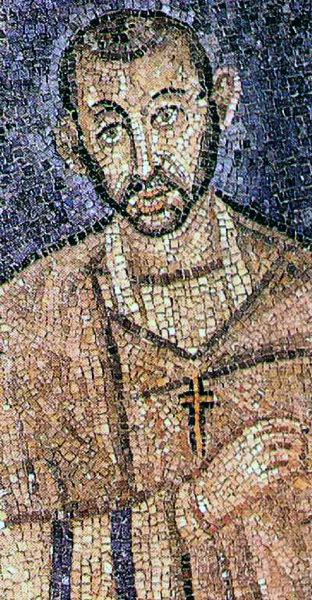 The holy bishop constantly incites against the Goths, conjures the world not to let down the guard, and for him ‘practically any means is not only justified but also necessary’ (K.P. Schneider).
The holy bishop constantly incites against the Goths, conjures the world not to let down the guard, and for him ‘practically any means is not only justified but also necessary’ (K.P. Schneider).
Ambrose had sent the holy emperor his pastoral work De fide, written during the conflict with the Goths, to the battlefield of Illyria, knowing that a victory should provide ‘more faith in the emperor of the courage of the soldiers’ (fide magis imperatoris quam virtute militum), with which he again incites against the Arians, who in reality are only human beings in their outward appearance, because in their interior they are ferocious animals. Although he prophesies the triumph, he is sure of victory ‘as a testimony of the true faith’.
The Arians, who ‘arrogated to themselves the name of Christians’ and yet ‘tried to wound with deadly weapons’ the Catholics, seemed, according to Ambrose, like the Jews, although they were worse, and also like the pagans, although in fact they were even worse: more like the antichrist and the devil himself. They had ‘gathered the poison of all heresies’,’ they were human beings only in their external aspect, but inside they were full of the rage of animals’.
Time to troll the Observer
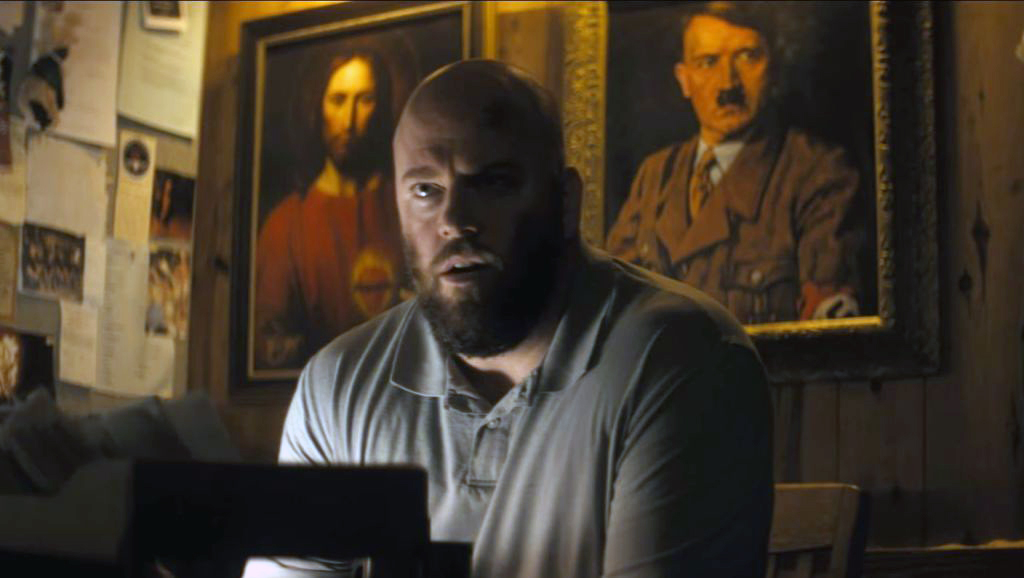
Apparently, someone has been trying to discuss with MacDonald by email about this devastating critique of his naïve views on Christianity, to no avail. Instead, the retired professor has published an article by a Christian pundit that advances exactly the opposite point of view of this site.
In the first instalment of that piece, the author wrote: ‘Men of the Alt Right can and should recast themselves in the role of Christian cultural (maybe even holy) warriors fighting to regenerate once-Christian nations’. In the last sentence of the second instalment, he concluded: ‘The mission of the Alt Right, should it choose to accept it, is to spark the resurrection of the Church from the dead, not in a Rapture event next year, or in the far-distant future, but rather in the here and now’.
When whites become extinct by the middle of the 22nd century, bewildered Chinese intellectuals will be trying to figure out why these valiant defenders of the white race remained addicted to their Jewish opium. And believe me, this Judeo-Christian cult (‘ethnocentrism for me but universalism for thee’) is opium for the Aryan mind.
Visitors from The Occidental Observer who doubt the accuracy of this diagnosis should read (1) Evropa Soberana’s Rome vs. Judea, (2) Jack Frost’s PDF, (3) the recently published Why Europeans Must Reject Christianity by Ferdinand Bardamu, and tomorrow I shall resume the translations from the Kriminal-geschichte series.
Keep tuned!
Julian, 30
Julian presiding at a conference of Sectarians
(Edward Armitage, 1875)
Julian Augustus
In March 351, I was admitted to the mysteries of Mithras. On that day I watched the rising of the sun; and I watched its setting, taking care to be unobserved, for since Constantius had made it illegal to pray to the sun, people had even been arrested for watching a sunset. Spies and informers were everywhere.
I had told Ecebolius that I intended to spend the day hunting on the slopes of Mount Pion. Since he hated hunting, he excused himself as I knew he would. He quoted Homer. I quoted Horace. He quoted Virgil. I quoted Theocritus. Together we used up nearly all of literature’s references to hunting.
The next obstacle was the bodyguard. Twelve soldiers and one officer were assigned to my household. At all times I was attended by at least two men. What to do about them? It was Maximus who decided that since Mithras is the soldier’s religion, at least two of the soldiers should prove sympathetic. Maximus was right. Of the twelve, five were Mithraists. It was then an easy matter to get two of the five assigned to me for the day. As Mithraic brothers, they were under the seal of secrecy.
An hour before dawn, Oribasius, the soldiers and I left the house. At the mountain’s edge we were met by Maximus and nine fathers. In silence we climbed the slope. At a pre-ordained spot, beneath a fig tree, we stopped and waited for the sun to rise.
The sky turned pale. The morning star shone blue. Dark clouds broke. Then just as the sun appeared on the horizon, a single shaft of light struck the rock behind us and I realized that it was not just ordinary rock, but a door into the mountainside. We prayed then to the sun and to his companion Mithras, our saviour.
When the sun was at last above the horizon, Maximus opened the door into the mountain and we entered a small cave with seats carved out of the rock. Here Oribasius and I were told to wait while the fathers of Mithras withdrew into yet another cave, the inner sanctuary. Thus began the most momentous day of my life. The day of the honey and of the bread and the wine; the day of the seven gates and the seven planets; the day of challenges and of passwords; the day of prayer and, at its end (past Raven, Bride, Soldier, Lion, Persian, Courier of the Sun, and Father), the day of Nama Nama Sebesio.
Libanius: Of all the mysteries, excepting those at Eleusis, the Mithraic is the most inspiring, for in the course of it one actually experiences the folly of earthly vanity. At each of the seven stages, the initiate acts out what his soul will one day experience as it rises amongst the seven spheres, losing one by one its human faults. At Ares, the desire for war returns to its source; at Zeus, ambition is lost; at Aphrodite, sex, and so on until the soul is purged. Then… But I can say no more. Nama Nama Sebesio.
Julian Augustus
When the day ended, Oribasius and I stumbled from the cave, born again.
It was then that it happened. As I looked at the setting sun, I was possessed by light. What is given to few men was given to me. I saw the One. I was absorbed by Helios and my veins coursed not with blood but light.
I saw it all. I saw the simplicity at the heart of creation. The thing which is impossible to grasp without the help of divinity, for it is beyond language and beyond mind: yet it is so simple that I marvelled at how one could not have known what is always there, a part of us just as we are part of it. What happened inside the cave was a testing and a learning, but what happened to me outside the cave was revelation.
I saw the god himself as I knelt among sage bushes, the red slanting sunlight full in my face. I heard that which cannot be written or told and I saw that which cannot be recorded in words or images. Yet even now, years later, it is as vivid in retrospect as it was at the time. For I was chosen on that steep mountainside to do the great work in which I am now engaged: the restoration of the worship of the One God, in all his beautiful singularity.
I remained kneeling until the sun was gone. Then I knelt in darkness for what I am told was an hour. I knelt until Oribasius became alarmed and awakened me… or put me to sleep, for the “real” world ever since has seemed to me the dream while my vision of Helios is the reality.
“Are you all right?”
I nodded and got to my feet. “I have seen…” But I stopped. I could not say what I had seen. Even now, writing this memoir, I cannot describe what I experienced since there is nothing comparable in ordinary human experience.
But Maximus immediately recognized what had happened to me. “He has been chosen,” he said. “He knows.”
Silently we returned to the city. I did not want to talk to anyone, not even to Maximus, for I was still enfolded by wings of light. Even the back of my hand where I had received the sacred tattoo did not hurt me. But at the city gate my absorption was rudely shattered by a large crowd which surrounded me, shouting, “Great news!”
I was bewildered. All I could think was: has the god remained with me? is what I saw visible to all? I tried to speak to Maximus and Oribasius but we could not make ourselves heard.
At the prefect’s house, I found Ecebolius with the town prefect and what looked to be the whole council. When they saw me, they fell to their knees. For an instant I thought it was indeed the end of the world and that I had been sent as messenger to separate the good from the bad. But Ecebolius quickly dispelled all thought of apocalypse.
“Most noble Julian, your brother…” All about us, men began to repeat Gallus’s names and titles. “… has been raised by the divine Augustus to share with him the purple. Gallus is Caesar in the East. He is also to be married to Constantia, divine sister of the divine Augustus!”
There was loud cheering and eager hands touched my robe, my hands, my arms. Favours were requested, blessings demanded. Finally, I broke through the mob and got inside the house.
“But why are they all behaving like lunatics?” I turned on Ecebolius, as though it were his fault.
“Because you are now the brother of a reigning Caesar.”
“Much good it will do them… or me.” This was unwise, but it relieved me to say it.
“Surely you don’t want them to love you for yourself?” Oribasius teased me. “You quite enjoyed the attention, until you heard the news.”
“Only because I thought it was the sun…” I stopped myself just in time.
“The sun?” Ecebolius looked puzzled.
“Only the son of God should be treated in this fashion,” said Maximus smoothly. “Men should not worship other men, not even princes.”
Ecebolius nodded. “A relic of the bad old days, I’m afraid. The Augustus of Rome is of course ‘divine’ though not truly a god as men used to think. But come in, come in. The baths are ready. And the prefect is giving us a banquet to celebrate the good news.”
So I beheld the One God on the same day that I learned my brother had been made Caesar. The omen was plain enough. Each was now set in his destiny. From that day on I was Hellenist or, as the Galileans like to call me (behind my back, of course!), apostate. And Gallus reigned in the East.
The title page of the manuscript of Der Antichrist. Fluch auf
das Christenthum (The Antichrist: Curse on Christianity).
This book belongs to the most rare of men. My day won’t come until the day after tomorrow. Some men are born posthumously.
You need to be used to living on mountains—to seeing the miserable, ephemeral little gossip of politics and egoism of the peoples beneath you.
These are my only readers, my true readers, my predestined readers: and who cares about the rest of them? The rest are just humanity. You need to be far above humanity in strength, in loftiness of soul, —in contempt…
—Friedrich W. Nietzsche



